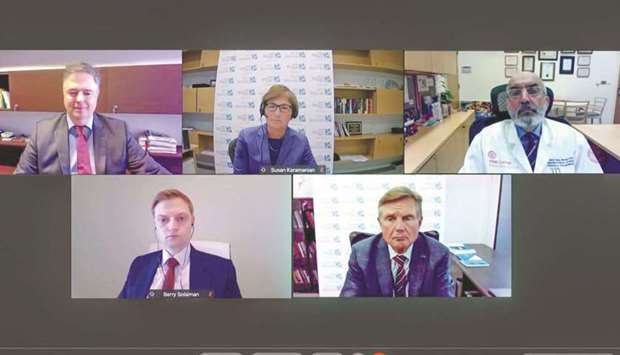A webinar jointly organised by the College of Law and the College of Public Policy (CPP) at Hamad Bin Khalifa University (HBKU) probed critical considerations for an equitable and effective distribution of Covid-19 vaccines.
The vaccine rollout is a major step toward ending the pandemic and saving lives. However, the speed at which vaccines have been developed, their unequal distribution among and within countries and states, and the potential impact of vaccinations on individual access to travel or facilities such as sports and concert arenas, have raised challenging legal, medical, policy, and ethical concerns.
Dr Susan L Karamanian, dean, College of Law, opened the webinar with a brief introduction of the issues , including legal ones such as whether immunisation should be mandated for all, or certain workers, or whether a person should be allowed to refuse the vaccine. Dr Leslie A Pal, dean, CPP, also presented words of welcome and emphasised the policy dimensions of vaccine distribution.
The expert panel featured Dr. Andreas Rechkemmer, professor, CPP; Dr Barry Solaiman, assistant professor, College of Law; and Dr Mohamed A Verjee, associate professor, assistant dean, Medical Student Affairs, Weill Cornell Medicine-Qatar. In recognition of the interdisciplinary nature of the subject, the speakers exchanged perspectives from their respective disciplines to examine the challenges and proposed measures to improve effective distribution.
Speaking about the complexity of the equitable allocation of the vaccine, dean Karamanian observed, “The development of Covid-19 vaccines has given the world some sense of an end to the pandemic. Although some countries have already administered millions of doses, many others continue to struggle to acquire vaccines.
“The pandemic has had a huge impact on the whole world and when developing vaccine distribution strategies, it is important to ensure that we cater to those who are most in need. Policy responses should always be ethical and follow the public good. But in this case, advocating for the equitable allocation of vaccines is not only a matter of ethics and compassion but also practicality and rationality.” Dr Pal, added.

